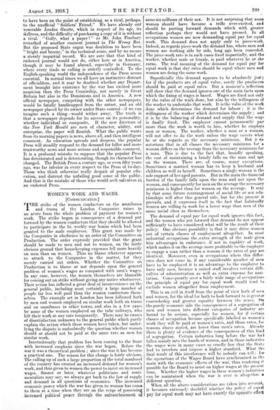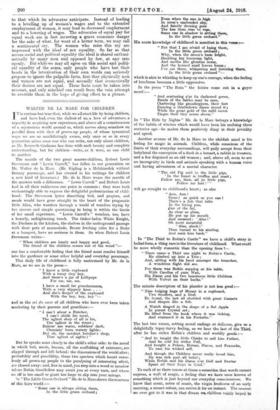WOMEN'S WORK AND WAGES. [COMMUNICATED.] T HE strike of the women
conductors on the omnibuses and trams of the London Companies raises in an acute form the whole problem of payment for women's work. The strike began in consequence of a demand put forward by the women conductors that they should be allowed to participate in the 5s. weekly war bonus which had been granted to the male employees. This grant was made by the Companies in obedience to an order of the Committee on Production. The order expressly provided that the grant should be made to men and not to women, on the fairly obvious ground that housekeeping expenses fell more heavily on men than on women. Thus no blame ,whatever appears to attach to the Companies in the matter, for they merely carried out orders. Whether the Committee on Production is to blame or not depends upon the general problem of women's wages as compared with men's wages. In any case, however, the women themselves are blamable for coming out on strike without giving any notice whatsoever. Their action has inflicted a great deal of inconvenience on the general public, including most certainly a large number of people far less well paid than the women conductors them- selves. The example set in London has been followed both by men and women employed on similar work both on trams and on omnibuses in other towns, and also in a few cases by some of the women employed on the tube railways, who left their work at any rate temporarily. There may be causes of dissatisfaction unknown to the general public which partly explain the action which these women have taken, but under- lying the dispute is undoubtedly the question whether women should or should not be paid at the same rate as men for similar work.
Intermittently that problem has been coming to the front with increased emphasis since the war began. Before the war it was a theoretical problem ; since the war it has become a practical one. The reason for this change is fairly obvious. The calling up of such a large proportion of the total manhood of the country has created an increased dethand for women's work, and thus given to women the power to insist on increased wages. Sooner or later, whatever politicians and senti- mentalists may say, we always get back to the law of supply and demand in all questions of economics. The increased economic power which the war has given to women has come to them at a time when they are on the verge of possessing increased political power through the enfranchisement of some six millions of their sex. It is not surprising that some women should have become a trifle over-excited, and should be putting forward demands which with greater reflection perhaps they would not have pressed. In all occupations women are now demanding equal pay for equal work. This demand does not apply only to piece-work. Indeed, as regards piece-work the demand has, where men and women are working side by side, long ago been conceded. The piece-work rate is in such cases fixed impartially, and the worker, whether male or female, is paid whatever he or she earns. The real meaning of the demand for equal pay for equal work is that day rates should be equal where men and women are doing the same work.
Superficially this demand appears to be absolutely just; for if the products are of equal value, surely the producers should be paid at equal rates. But a moment's reflection will show that the demand ignores one of the main facts upon which the fixing of wages is based. Wages are fixed not only by the value of the work done, but also by the willingness of the worker to undertake that work. It is the value of the work done which determines the demand for labour ; it is the willingness of the worker which determines the supply ; and it is by the balancing of demand and supply that the wage is finally fixed. The employer cannot permanently pay more than the work is worth to him, whether he employs men or women. The worker, whether a man or a woman, will not offer to do the work unless the wage covers what he or she regards as the necessary minimum. But it a notorious that in all classes the necessary minimum for a woman differs on the average from the necessary minimum for a man. This is due to the fact that, broadly speaking. the cost of maintaining a family falls on the man and not on the woman. There are, of course, many exceptions. Sometimes a married woman has to keep k husband and children as well as herself. Sometimes a single woman is the sole support of her aged parents. But in the main the financial burden of the family falls upon the man and not upon the woman, and consequently for men on the average the necessary minimum is higher than for women on the average. It may be that some future rearrangement of social life or sex rela- tionships will alter this general rule, but for the present it prevails, and it expresses itself in the fact that habitually women are willing to work for a lower wage than men of the same social class as themselves.
The demand of equal pay for equal work ignores this fact, and the women who put forward that demand do not appear sufficiently to have considered what will be the result of their policy. One obvious possibility is that it may drive women out of certain classes of employment altogether. In most industrial occupations the ,extra strength of the male gives him advantages in endurance, if not in rapidity of work, which makes it on the average more profitable to the employer to engage a man rather than a woman if the rates of pay are identical. Moreover, even in occupations where this differ- ence does not come in, if any considerable number of men have to be employed it is an advantage to the employer to have only men, because a mixed staff involves certain diffi- culties of administration as well as extra expense for sani- tation. Consequently over a fairly wide range of occupations the principle of equal pay for equal work would tend to exclude women altogether from employment.
This is an evil in itself from the point of view both of men and women, for the ideal for both to look forward to is greater comradeship and greater equality between the sexes. On the purely economic side the consequences of a segregation of men and women into different categories of industry are bound to be serious, especially for women, for if certain classes of occupation become specifically labelled as women's work they will be paid at women's rates, and those rates, for reasons above stated, are lower than men's rates. Already there is plenty of evidence of the consequences of this kind of segregation. Certain industries long before the war had fallen mainly into the hands of women, and in those industries the wages were in many cases so cruelly low that the State had to interfere and impose a higher standard. What the final result of this interference will be nobody can tell ; for the operations of the Wages Board have synchronized in the main with the economic effects of the war, thus rendering it possible for the Board to insist on higher wages at the present time. Whether the higher wages in these women's industries can be maintained when the war is over is altogether a different question. When all the above considerations are taken into account, it becomes extremely doubtful whether the policy of equal pay for equal work may not have exactly the opposite effect to that which its advocates anticipate. Instead of leading to a levelling up of women's wages and to the extended employment of women, it may lead to decreased employment and to a lowering of wages. The advocates of equal pay for equal work are in fact incurring s grave economic danger for the sake of what, for want of a better term, we may call a sentimental cry. The women who raise this cry are impressed with the ideal of sex equality. So far as that means social and political equality the ideal is shared enthusi- astically by many men and opposed by few, at any rate openly. But while we may all agree on this social and politi- cal equality of the sexes, only people who have lost their heads in the intoxication of their own words can seriously propose to ignore the palpable facts, first that physically men and women are not equal, and secondly that economically their desires are not equal. These facts must be taken into account, and only mischief can result from the vain attempt to override them in the hope of giving effect to a phrase.



























 Previous page
Previous page